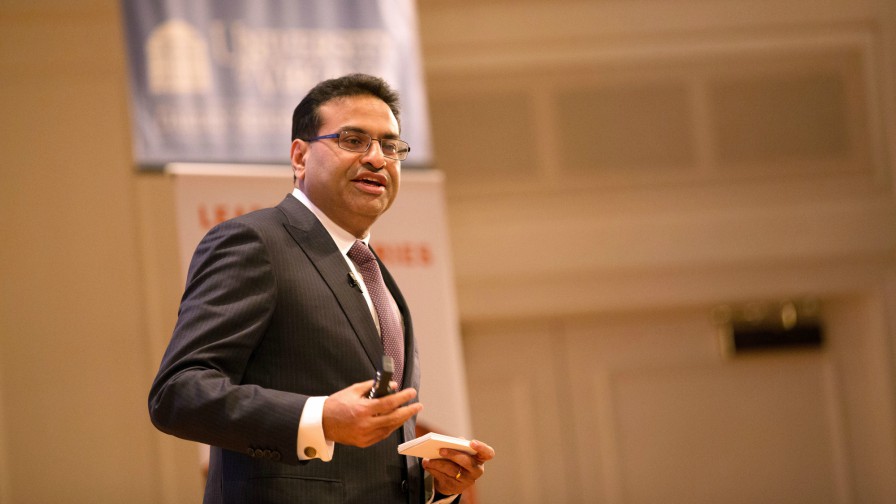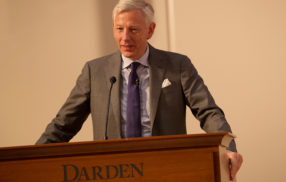
PepsiCo Executive Shares Keys of Successful Global Leadership
By Dave Hendrick
Laxman Narasimhan, PepsiCo CEO of Latin America and Europe Sub-Saharan Africa, is living in his 16th home in the last 24 years, as a global career at McKinsey & Co. and then Pepsi took him to cities including New Delhi, Tokyo and San Francisco.
Now settled for the time being in New York, Narasimhan said the varied global business experiences gave him a close-up view to the forces reshaping global commerce in the 21st century.
Speaking at the University of Virginia Darden School of Business as part of the Leadership Speaker Series, Narasimhan further said the current unprecedented rate of change was dramatically changing the nature of leadership and what it meant to be a leader.
Narasimhan, who previously led McKinsey’s research into consumers in emerging markets, said the five forces remaking the global business landscape were:
- Globalism and localism, each of which must be understood and respected
- Digital analytics and technology everywhere
- Open source, as closed systems give way to partners, collaborations and outside ideas
- Sustainability, as good corporate citizenship takes on increasing importance
- The talent war, as the limited set of people with the skills to lead into the future are widely coveted
With those forces as the backdrop, Narasimhan said his own varied global career had taught him the value of six key attributes of a successful leader, including:
- Unrelenting curiosity. “If there is no curiosity, there is no learning, and if there is no learning, there is no growth,” said Narasimhan.
- Humility, and the acceptance that the more you learn, the less you know.
- It’s all about people, and it’s important to surround yourself with a diverse, driven and intelligent group.
- Communication, including the ability to transmit ideas both broadly and narrowly.
- Balance, including between work and life, and performance and purpose. “You have to realize your place in society,” Narasimhan said. “Unless you have a purpose, how you perform really doesn’t mean very much.”
- Dig deep, and learn about yourself. Only when you know yourself, will you be able to lead others.
Above all, the Pepsico executive encouraged the Darden students to lead with empathy and humility and to be open to possible paths their careers could take. Noting the Darden brand campaign encouraging students to “Put your why to work,” Narasimham said to be prepared for one’s “why” to evolve over time.
Said Narasimhan, “You might know your ‘why’ now, but be prepared that experiences may shape what that comes over time — and that’s okay.”
The University of Virginia Darden School of Business prepares responsible global leaders through unparalleled transformational learning experiences. Darden’s graduate degree programs (MBA, MSBA and Ph.D.) and Executive Education & Lifelong Learning programs offered by the Darden School Foundation set the stage for a lifetime of career advancement and impact. Darden’s top-ranked faculty, renowned for teaching excellence, inspires and shapes modern business leadership worldwide through research, thought leadership and business publishing. Darden has Grounds in Charlottesville, Virginia, and the Washington, D.C., area and a global community that includes 18,000 alumni in 90 countries. Darden was established in 1955 at the University of Virginia, a top public university founded by Thomas Jefferson in 1819 in Charlottesville, Virginia.
Press Contact
Molly Mitchell
Associate Director of Content Marketing and Social Media
Darden School of Business
University of Virginia
MitchellM@darden.virginia.edu









